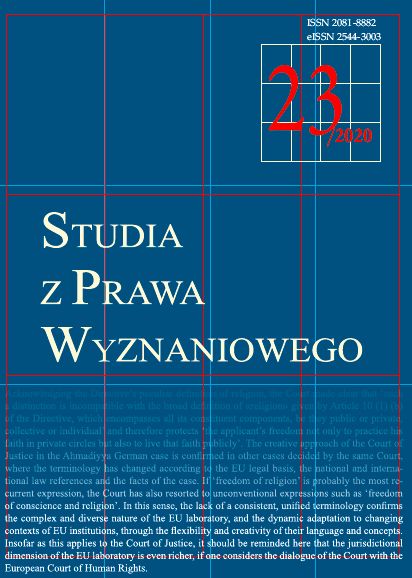Opinia prawna na temat beneficjenta rzeczywistego w przypadku spółki kapitałowej, której jedynym (100%) udziałowcem czy akcjonariuszem jest zakon bądź jego jednostka organizacyjna (prowincja zakonna, opactwo, klasztor niezależny, dom zakonny)
A legal opinion on the real beneficiary of a limited company in which the only (100%) shockholder or shareholder is an order or its organizational unit (a monastic province, an abbey, an independent monastery or a monastic house)
Author(s): Dariusz WalencikSubject(s): Law, Constitution, Jurisprudence, Constitutional Law, Civil Law, Law on Economics, Canon Law / Church Law, Commercial Law, Comparative Law, Labour and Social Security Law
Published by: Katolicki Uniwersytet Lubelski Jana Pawła II - Wydział Prawa, Prawa Kanonicznego i Administracji
Keywords: limited companies; financing terrorism; canon law; monastic house; beneficjent rzeczywisty; spółki kapitałowe; pranie pieniędzy; finansowanie terroryzmu; zakon; prawo kanoniczne;
Summary/Abstract: The aim of this legal opinion is to address the following question: Who is the real beneficiary of a limited company in which the only (100%) shockholder or shareholder is an order or its organizational unit (a monastic province, an abbey, an independent monastery or a monastic house)? The analysis of Polish law and canon law leads to the conclusion that in the case of a limited company whose only (100%) shockholder or shareholder is an order or its organizational unit (a monastic province, an abbey, an independent monastery or a monastic house), the real beneficiary is the competent higher superior of this order as well as members of its council. These persons satisfy the conditions specified in art. 2 para. 2 of the act of 1 March 2018 on countering money laundering and financing of terrorism, because they are a group of natural persons who exercise direct control of the company due to the entitlements they have (shareholders’ meeting/general meeting), which make it possible to exert a decisive influence on the actions or activities undertaken by the company. This is so because it is a group of natural persons who exert control over a legal person (an order or its organizational unit) who is entitled to hold more than 25% of the shares of the company stock and more than 25% of the voting rights in the decision-making body of the company (art. 2 para. 2 point 1 letter a and tiret three of the act on countering money laundering and financing of terrorism).
Journal: Studia z Prawa Wyznaniowego
- Issue Year: 2020
- Issue No: 23
- Page Range: 471-488
- Page Count: 18
- Language: Polish

